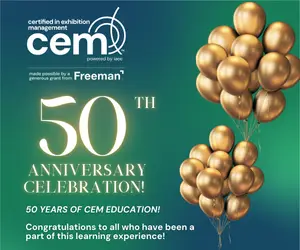Originally published by Trade Show Executive, September 2018 Edition
Last month I discussed the changing landscape of exhibitions and events in terms of the effect diversity has on how we approach our business model. Upon further reflection, the thought struck me that this evolution extends to how we approach certain leadership activities, such as mentoring.
I find the term “evolution” quite fitting because, as in nature, any industry that doesn’t evolve will eventually die out. The interesting correlation to mentorship is that, as in nature, any industry that doesn’t produce “offspring” to continue its legacy will also die out. When you look at the reality from this angle, mentorship becomes a crucial element in maintaining the vitality of our industry. From the perspective of an industry leader, our call of duty becomes very clear.
The Internet is a cornucopia of information from trusted sources such as Forbes and the Harvard Business Review outlining the advantages to engaging in mentorship. There is a wealth of information on the benefits of acting as a mentor, such as how shaping top talent contributes to your own business goals; how mentoring enhances your strategic thinking; and how teaching is, in fact, a wonderful learning tool. Likewise, it is well-documented that having a mentor increases your self-confidence, builds your professional network and gives you an unequivocal edge over those who are learning the ropes on their own. These are just a few examples among many.
The fundamental values of mentorship are solid, tried and true. I don’t see a need to fix what isn’t broken. Where I see change is in the perception of the relationship between mentor and mentee. My generation tended to view our mentors as all-knowing, infallible beings and our role as mentees to be more of a “mouth shut/ears open” proposition. Today’s perception leans more toward a mutually beneficial relationship in which both parties have something to teach and both parties have something to learn.
I am not suggesting that the voice of experience is not a powerful one. As of today, anyway, there is no school or certification program that will teach you what decades of being out in the field, working with multitudes of colleagues and traversing real-time challenges will impress upon you. The proverb, “experience is the mother of wisdom,” comes to mind.
What I am suggesting is that when you consider the effect that technology has on our industry, combined with the fact that the majority of today’s workforce is comprised of young professionals, plus the demand to keep the industry going strong… the conversation becomes much more two-way than the traditional mentorship model.
As an organization deeply rooted in the success and sustainability of our industry, IAEE has revamped its mentor program to make the most of this invaluable resource. Because we don’t want to simply survive, we want to thrive! As such, the IAEE Thrive Tribe offers a community of like-minded professionals the opportunity to share information and grow together through access to articles, webinars and assessments. IAEE Thrive Tribe also serves to connect mentors and mentees in a way that maximizes what each person has to offer and the overall experience of paying it forward.
As the old saying goes, it takes a village to raise a child. I like to think of the exhibitions and events “village” as one that thrives on its dynamic tribe of current and up-and-coming leaders. Let’s keep that momentum going by staying fully engaged in mentorship!
David DuBois, CMP, CAE, FASAE, CTA
President & CEO
IAEE



